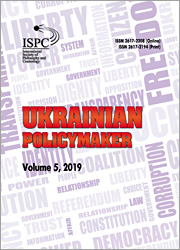Imitating Democracy and Populism as an Attribute of Modern World Countries
Imitating Democracy and Populism as an Attribute of Modern World Countries
Author(s): Mariia PryzigleiSubject(s): Government/Political systems, Sociology of Politics
Published by: Международное философско-космологическое общество
Keywords: political regime;liberal democracy;imitative democracy;populism;anti-liberal political movements;
Summary/Abstract: Spreading of imitation democracy and populism as the attributes of modern world countries are analyzed in the article. It is established that a totalitarian-democratic society, as a rule, is characterized by illusory economic prosperity, multicultural diversity of customs and traditions, free access to information and dissemination, many freedoms and conveniences. All this illusion is actively supported by the government and the media, which in such societies are directly controlled by the state or belonging to groups loyal to power and serve as a tool for balancing and counteracting antagonistic movements. It is revealed that the totalitarian-democratic regime seeks to integrate any opposition and absorb possible alternatives to the development of the state. That is, on the one hand, the establishment of imitative democracy proclaims the state democratic, formally enshrining all the principles of a democratic society, and on the other, insulates civil society from participation in the formation and exercise of public authority. In addition, totalitarian democracy does not seek to resolve social contradictions but obscures them with a screen with false symbols and values. It has been found that since the activities of antagonistic movements in totalitarian democracies are not a threat to their existence, critically-minded activists are generally not persecuted or even encouraged. The government seeks to create the conditions under which any criticism becomes trivial and routine and, accordingly, imperceptible to most of society. The proposals on the necessary actions for overcoming the “challenge” of populism and minimizing the risks of spreading the regime of imitative democracy in the world are highlighted, in particular: mobilization of civil society in support of democratic institutions; strengthening the rationalization and institutionalization of the political process; political isolation of populists through the formation of large centrist coalitions in parliaments; more active involvement of citizens in the democratic process of decision-making; formulating an attractive program agenda; attracting new people to centrist parties.
Journal: Ukrainian Policymaker
- Issue Year: 5/2019
- Issue No: 5
- Page Range: 77-88
- Page Count: 12
- Language: English

